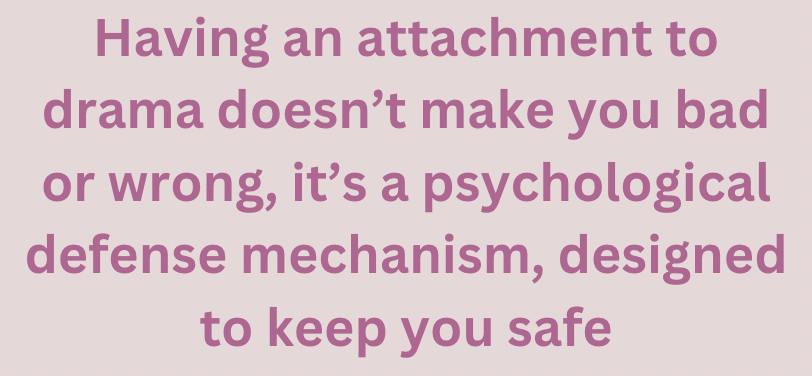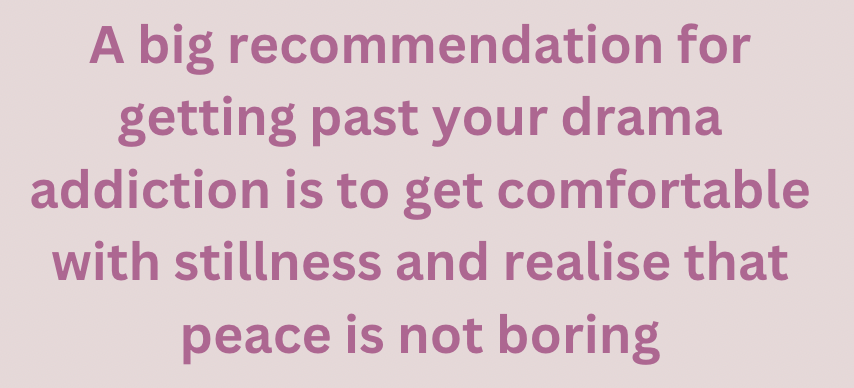When you have an attachment to drama it can create a big impact on the success of your business. You unconsciously create unnecessary chaos, lose focus and get distracted from your goals as you try to manage your fluctuating emotions.
In this week’s blog we’ll be exploring the origins of attachment to drama and how we use it as a coping mechanism. We’ll look at how to identify if you’re addicted to drama and how to build better coping strategies. Finally, we’ll address how to recognise triggers for drama and how to limit your exposure for greater business success.
Ready to dive in?
Origins of attachment to drama
Emotion and biology play a part in the formation of your attachment to drama. Leslie Finlay, says research has identified three key components of NFD (need for drama). 1) An interpersonal manipulation to control others behaviours and reactions or meet a personal need or goal, 2) Impulsive, uncontrolled outspokenness (often with fabrication or exaggeration) when you share thoughts, stories and opinions, 3) Persistent perceived victimhood.
Meredith Van Ness, LCSW and founder of Balanced + Well says people with NFD “may also have difficulty regulating their emotions and may rely on drama as a way to cope with stress or feelings of loneliness”. She goes on to say that people can have an attachment to drama and seek it out due to boredom, a need for excitement or a distraction from deeper psychological issues.

If you’ve grown up in an environment where chaos was normalised this can lead you to unconsciously seek out drama. Because it’s familiar and therefore becomes a comfortable state. And that’s not all. Those with low self-esteem or unresolved emotional issues might lean towards drama as a way to seek validation or attention.
There are also biochemical underpinnings at play here which can trigger the release of neurotransmitters like dopamine, adrenaline, and cortisol. This creates, even for the shortest time, a feeling of both being mad but equally energised instead of sad and lethargic. It’s these feelings that we become attached to, craving more of this instant hit.
Identifying drama and adopting coping strategies
Having an attachment to drama, whether consciously or unconsciously, can deeply impact your business. From experiencing emotional instability, distraction from priorities, burnout and reduced creativity to making poor financial decisions.
To understand this further it’s good to look at how drama might be showing up in your life…
- Feeling anxious or bored when things are calm
- Making mountains out of molehills
- Pulling other people into the drama
- Craving extreme situations and sensations
- Making bad situations universal
- Feeling isolated
- Feeling like a victim all the time

Now you know ways in which your attachment to drama can show up, here are some ways to protect yourself and minimise the impact…
- Ground yourself in the present moment through techniques like breathing and tapping (EFT) – self-awareness of your emotional state is key
- Become aware of your stress response and how it’s affecting your thoughts, emotions and behaviours
- Work on ways to ‘slow down’ when you feel like you’re getting caught up in drama and give yourself time to process what you are experiencing
- Practice somatic exercises and move your body to release the overflow of biochemical responses
- Reframe your response to drama in positive ways instead of from a place of pain and defense
- Getting comfortable with stillness and realising that peace is not boring and it’s safe to explore your emotions
Recognising your triggers
Triggers related to your attachment to drama can stem from a combination of psychological, physiological and environmental factors.
Here are some of the most common triggers, which might influence your behaviour, and in turn affect the results you create in your business…
Emotional pain or trauma: If you’ve experienced unresolved emotional pain you may seek out drama in order to distract yourself from the deeper emotions.
Urgency culture and overstimulation: Living in a world that glorifies busyness can create discomfort during moments of stillness. Leading to restlessness and seeking out drama to create a sense of purpose
Past conditioning: Experiences in childhood, such as volatile home environments, can normalise conflict, drama and chaos as a form of connection or excitement. It can therefore become a coping mechanism for you as it creates familiarity and safety.

Now let’s explore ways to limit your exposure to these triggers…
Recognise patterns: Journaling or reflecting on situations that consistently lead to drama can help you identify what is triggering your habitual responses
Practice stillness: Setting aside time to just sit and be in your day, without external stimulation, can help you feel more calm, without the need for dramatic stimulation.
Focus on solutions: When you notice you’re starting to react, practice focusing on solutions before you fall into emotional escalation.
Are you reading to level up in your coaching business?
Now you’ve read this blog and taken away lots of lessons and insights, I’d love to support you even further and invite you to take my Entrepreneurial Confidence Quiz. Because without the right mindset, you won’t hit your money goals and create the impact you’re destined for. Are you ready to level up?
+ show Comments
- Hide Comments
add a comment